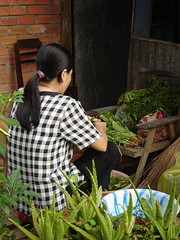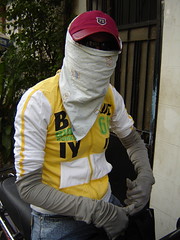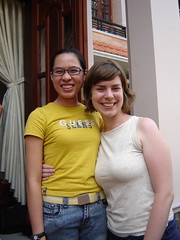Sometimes it's hard to gauge how much I've been learning here in Viet Nam. Most of my learning is being done through experience and observation, which is a gradual process. I was re-reading some passages in an anthropology textbook (Village in Vietnam by Gerald Cannon Hickey, written in the sixties) that I had read the first week I was here, and I realized how much of a better understanding of Vietnamese culture I have now, two months after I arrived in Sai Gon.
I was re-reading some passages about death and ancestor worship in a village in the Mekong Delta because the passages are directly related to my Independent Study Project topic. When I first read the passage, I remember thinking the practices and concepts were so foreign to anything I knew. I really couldn't picture the rituals he was describing. However, now, two months, three death anniversary celebrations and numerous conversations later, I recognize almost everything the author describes in the passage.
For example, Hickey describes the ideal tomb as being "of stone or concrete, on a site selected by a geomancer (123)." Last weekend, my homestay sister, My, showed me the tombs of her grandparents. They are all made of concrete. The tombs of her father's ancestors were all recently restored and newly tiled- showing that the appearance of the tomb is very important. She explained that land that her mother's ancestor's tombs are on is very good land because it is high up.
Hickey also describes the altar devoted to the ancestors as containing a picture of the ancestor where the relatives place offerings, burn joss sticks and kowtow. Indeed, almost every home contains one or more altars to their ancestors where the family members place fruit and other food. I have seen vietnamese friends burn joss sticks and kowtow before the altars multiple times.
I attended My's grandmother's second year death aniversary a few weeks ago. Hickey says that the second year death anniversary marks the end of the mourning period. A ritual is performed before the altar and, afterwards, the mourning clothes are burned. I was able to watch from a distance as a monk performed the ritual and a few family members burned joss sticks and kowtowed. During the ritual, the family members were wearing white cloth wrapped around their heads. Afterwards, they burned the cloths in a small fire outside of the house.
Lastly, Hickey states that it is very important to the elderly to have land and a good home to contain the altar of the ancestors for after they die. Indeed, on both sides of My's family, no one currently resides in the houses that her grandparents owned. The homes contain the altar of the ancestors and are also used for storage, while the family members have homes right next to the old home. On the sixteenth death anniversary celebration of My's father's mother, the celebration was held in the grandparent's home, even though there was a newer, nicer home on the same plot of land.
It was interesting to re-read those passages and remember where I had been two months ago. It's reassuring to know that I've gained at least a basic understanding of this aspect of Vietnamese culture. Of course, I only have a superficial understanding of ancestor worship at the moment, but as a I prepare to do my ISP and as I begin doing research in May, I hope to go deeper into the perceptions that My's family has of these rituals and how the rituals have changed from generation to generation.
Friday, April 14, 2006
Sunday, April 02, 2006
Ben Tre, Vietnam
My took me to visit her family in the Mekong Delta last weekend for her grandmother's two year death anniversary.
Her family was extremely warm and welcoming. Her mother and her aunts kept saying, "Dep qua!" Which means, "you are very beatiful." One time, I was walking through the kitchen and her mother said something which her brother translated as, "Mama does say you is so tall!" When her mom saw my passport photo she exclaimed in English, "You so FAT! But now you is thin- you look very good now." Hmmmm....I don't know about the candid honesty in this country.
Her mother, who I addressed as "Auntie," kept hugging me and grabbing my arm and giving me LOTS of food. They gave me the most food and the best food. The generosity here never ceases to amaze me.
Her brother is sixteen and a very good student. He stays up studying until one or two in the morning and then gets up at five to go to school (he also gets a nap in the afternoons.) He is especially interested in English. When he first met me he told me I was the first foreigner he had ever talked to. He spoke wonderful English with a very clear accent. I could tell he was very excited (and a little nervous) about practicing his English with me. I told him I would help him with his English homework any time.
My has a cousin that also lives with her parents. She was very shy, and never spoke to me (didn't speak much to anyone else either, for that matter). But, I could tell she was very sweet. She seemed to be content just observing me.
Her mother and father are also very hard workers. I think the lights were off in the house for maybe three hours that night. Her mother owns two boats and spends all day every day collecting coconuts. Her father works at a coconut mill.
Ben Tre is very famous for coconuts. They make famous coconut candy, but apparently you can do just about anything with coconuts, including making dishes, creating fuel, and of course, drinking and eating them.
My and I already have plans to go back to her home in two weeks. During my Independent Study Project I want to spend several long weekends there. I'm thinking of doing an ethnographical study of the village, focusing on the meaning of death and dying and the rituals involved.
Her family was extremely warm and welcoming. Her mother and her aunts kept saying, "Dep qua!" Which means, "you are very beatiful." One time, I was walking through the kitchen and her mother said something which her brother translated as, "Mama does say you is so tall!" When her mom saw my passport photo she exclaimed in English, "You so FAT! But now you is thin- you look very good now." Hmmmm....I don't know about the candid honesty in this country.
Her mother, who I addressed as "Auntie," kept hugging me and grabbing my arm and giving me LOTS of food. They gave me the most food and the best food. The generosity here never ceases to amaze me.
Her brother is sixteen and a very good student. He stays up studying until one or two in the morning and then gets up at five to go to school (he also gets a nap in the afternoons.) He is especially interested in English. When he first met me he told me I was the first foreigner he had ever talked to. He spoke wonderful English with a very clear accent. I could tell he was very excited (and a little nervous) about practicing his English with me. I told him I would help him with his English homework any time.
My has a cousin that also lives with her parents. She was very shy, and never spoke to me (didn't speak much to anyone else either, for that matter). But, I could tell she was very sweet. She seemed to be content just observing me.
Her mother and father are also very hard workers. I think the lights were off in the house for maybe three hours that night. Her mother owns two boats and spends all day every day collecting coconuts. Her father works at a coconut mill.
Ben Tre is very famous for coconuts. They make famous coconut candy, but apparently you can do just about anything with coconuts, including making dishes, creating fuel, and of course, drinking and eating them.
My and I already have plans to go back to her home in two weeks. During my Independent Study Project I want to spend several long weekends there. I'm thinking of doing an ethnographical study of the village, focusing on the meaning of death and dying and the rituals involved.
Motorbike Fashion and Function
There are three items that a proper Vietnamese woman never leaves home without: a hat, a face mask and long gloves.
The hat: it is absolutely essential to be wearing a hat between the hours of ten in the morning and four in the afternoon. The first thing my homestay sister gave me when I moved in was a hat of hers; she was horrified that I did not have one. She was very concerned that I would get sick from the sun if I was not wearing a hat.
The gloves: Vietnamese women do almost anything to avoid getting darker. Even if it 100 degrees and unbearably humid, a vietnamese woman will cover her arms and hands in order to stay as light as possible. Even with this lighter-the-better mentality, people still seem taken aback by how white I am- "So White," I often here when I meet new people.
The mask: This handy item serves two purposes. The first is, again, to cover the skin and avoid getting tanner. The second, is to filter all of the smog coming from the millions of motorbikes on the streets of saigon. I have to admit, I don't exactly enjoy breathing in so much exhaust, but I absolutely hate feeling my hot breath on the inside of my mask in all of this heat.
So, maybe by the time mom, dad, and Zakcq come to Saigon, I'll pick them up wearing a hat, mask and gloves, but as of now, I'm still an awkward westerner trying to get a tan and stay cool at the same time.
The hat: it is absolutely essential to be wearing a hat between the hours of ten in the morning and four in the afternoon. The first thing my homestay sister gave me when I moved in was a hat of hers; she was horrified that I did not have one. She was very concerned that I would get sick from the sun if I was not wearing a hat.
The gloves: Vietnamese women do almost anything to avoid getting darker. Even if it 100 degrees and unbearably humid, a vietnamese woman will cover her arms and hands in order to stay as light as possible. Even with this lighter-the-better mentality, people still seem taken aback by how white I am- "So White," I often here when I meet new people.
The mask: This handy item serves two purposes. The first is, again, to cover the skin and avoid getting tanner. The second, is to filter all of the smog coming from the millions of motorbikes on the streets of saigon. I have to admit, I don't exactly enjoy breathing in so much exhaust, but I absolutely hate feeling my hot breath on the inside of my mask in all of this heat.
So, maybe by the time mom, dad, and Zakcq come to Saigon, I'll pick them up wearing a hat, mask and gloves, but as of now, I'm still an awkward westerner trying to get a tan and stay cool at the same time.
My and me
This is my homestay sister, My (pronounced Mee). My grew up in Ben Tre, a village in the Mekong Delta. She moved to Ho Chi Minh City about three years ago to go to school. She attends the same university as me and is studying Chinese.
I really lucked out getting such a great sister. She is showing me all around the city and making sure I have the best experiences here. She's also super sweet. For example, the first time she met our entire group, she said she had to leave for an hour to do some things. When she came back she had a birthday present for Scott and some cream for Lauren who had just burned herself.
My homestay situation is a bit different than everyone elses, but I feel I really lucked out. As most of the others are on the outskirts of HCMC, living with a wealthy family, I am experiencing the typical student lifestyle. My, her roomate Ngoc and I all live, eat, sleep, study, and do everything else in one room that they rent in a house. We also have a bathroom, where I bathe with a spigot and a bucket. There isn't any room for a bed, or a table, so we sleep on a mat on the floor and eat off of newspapers spread out on the floor. Honestly, sleeping on the floor isn't so bad- sometimes my neck is stiff, but I think that's more from the pillow than anything else.
I'll be living with My for at least another three weeks. After that, I may contribute to her rent and stay another four weeks while I do my Independent Study Project. Her roomate is moving to France on Thursday, so she does need help with the rent, and I'd be happy to keep living with her rather than have the comforts (and unexcitement) of a hotel room.
I really lucked out getting such a great sister. She is showing me all around the city and making sure I have the best experiences here. She's also super sweet. For example, the first time she met our entire group, she said she had to leave for an hour to do some things. When she came back she had a birthday present for Scott and some cream for Lauren who had just burned herself.
My homestay situation is a bit different than everyone elses, but I feel I really lucked out. As most of the others are on the outskirts of HCMC, living with a wealthy family, I am experiencing the typical student lifestyle. My, her roomate Ngoc and I all live, eat, sleep, study, and do everything else in one room that they rent in a house. We also have a bathroom, where I bathe with a spigot and a bucket. There isn't any room for a bed, or a table, so we sleep on a mat on the floor and eat off of newspapers spread out on the floor. Honestly, sleeping on the floor isn't so bad- sometimes my neck is stiff, but I think that's more from the pillow than anything else.
I'll be living with My for at least another three weeks. After that, I may contribute to her rent and stay another four weeks while I do my Independent Study Project. Her roomate is moving to France on Thursday, so she does need help with the rent, and I'd be happy to keep living with her rather than have the comforts (and unexcitement) of a hotel room.
Subscribe to:
Posts (Atom)




